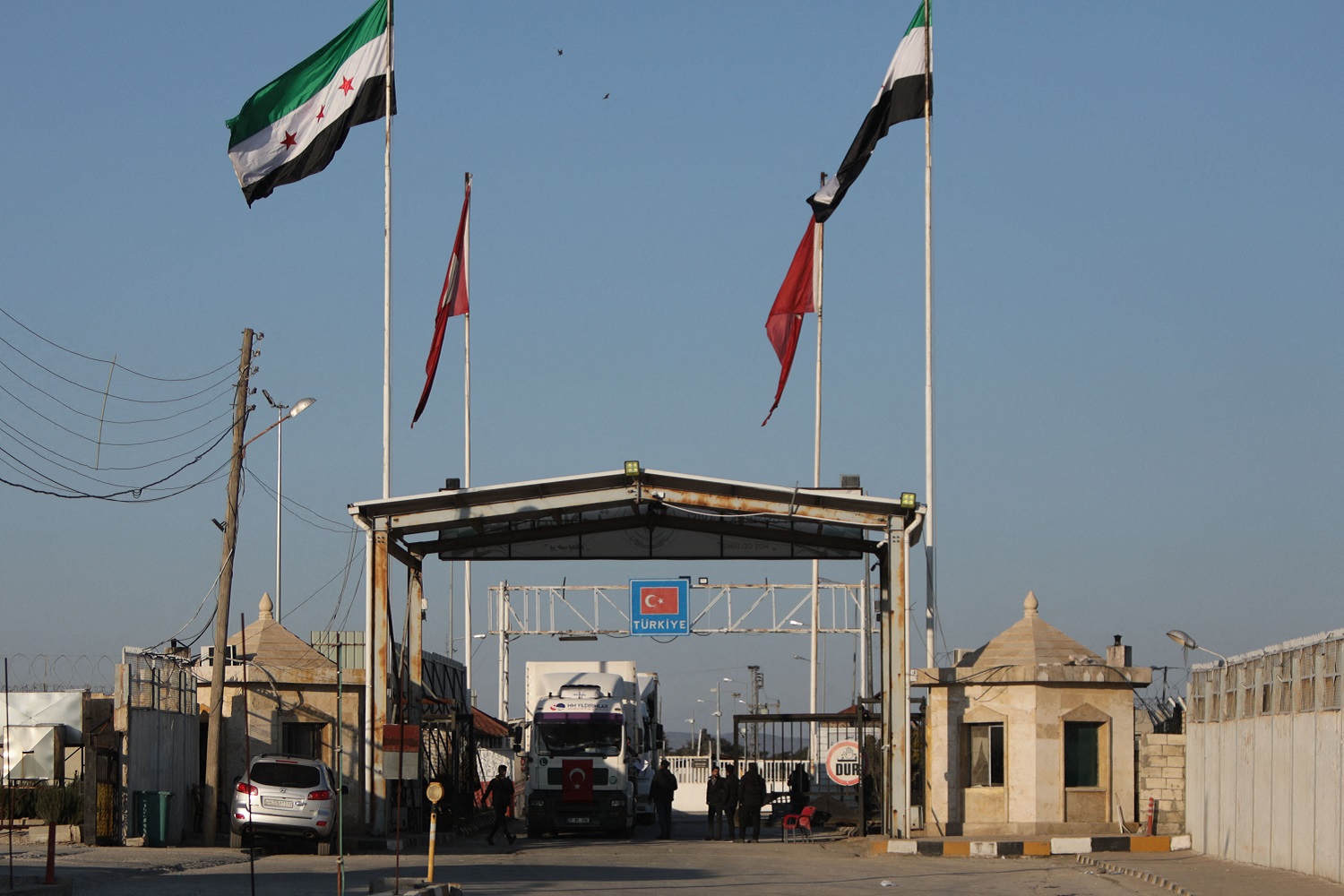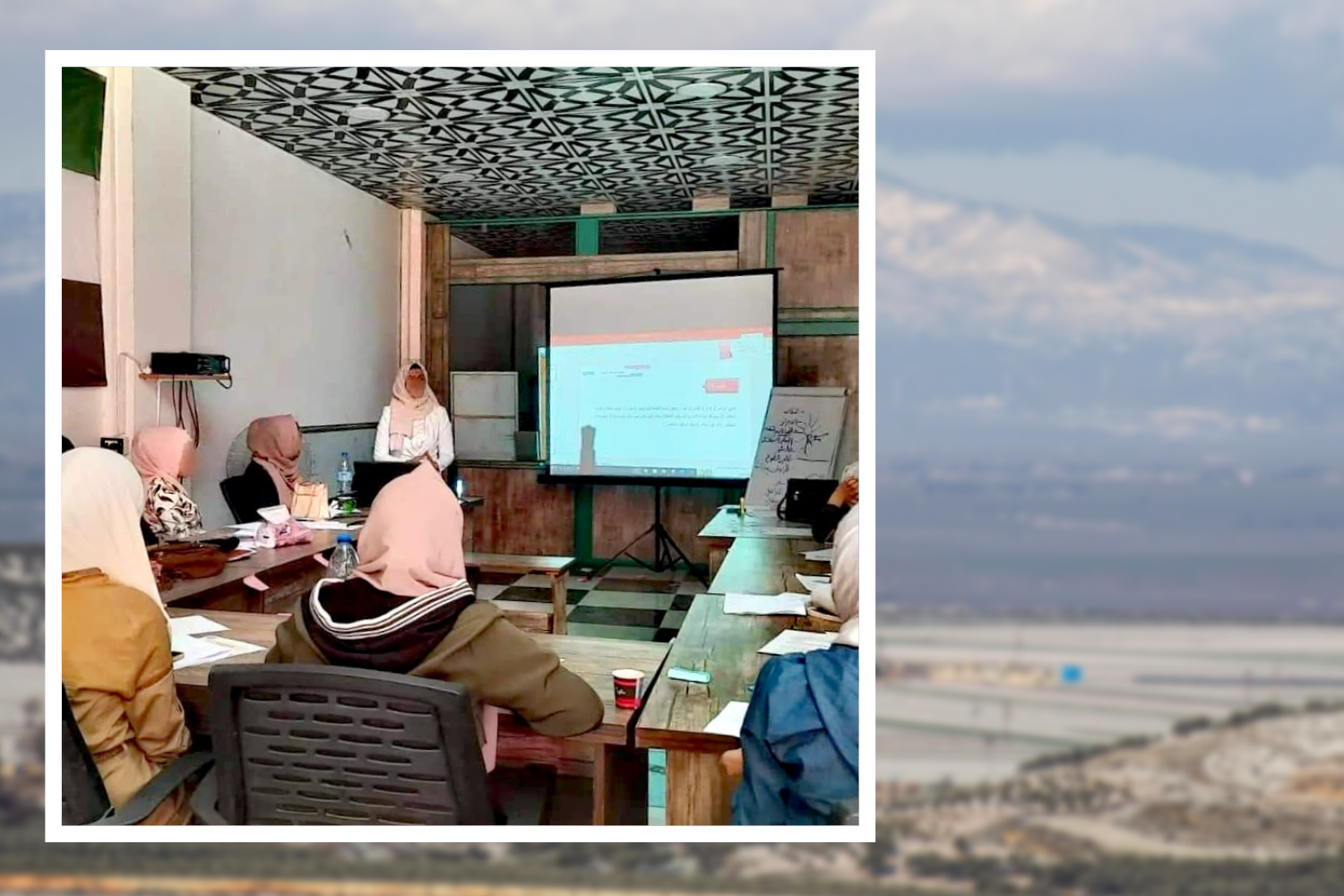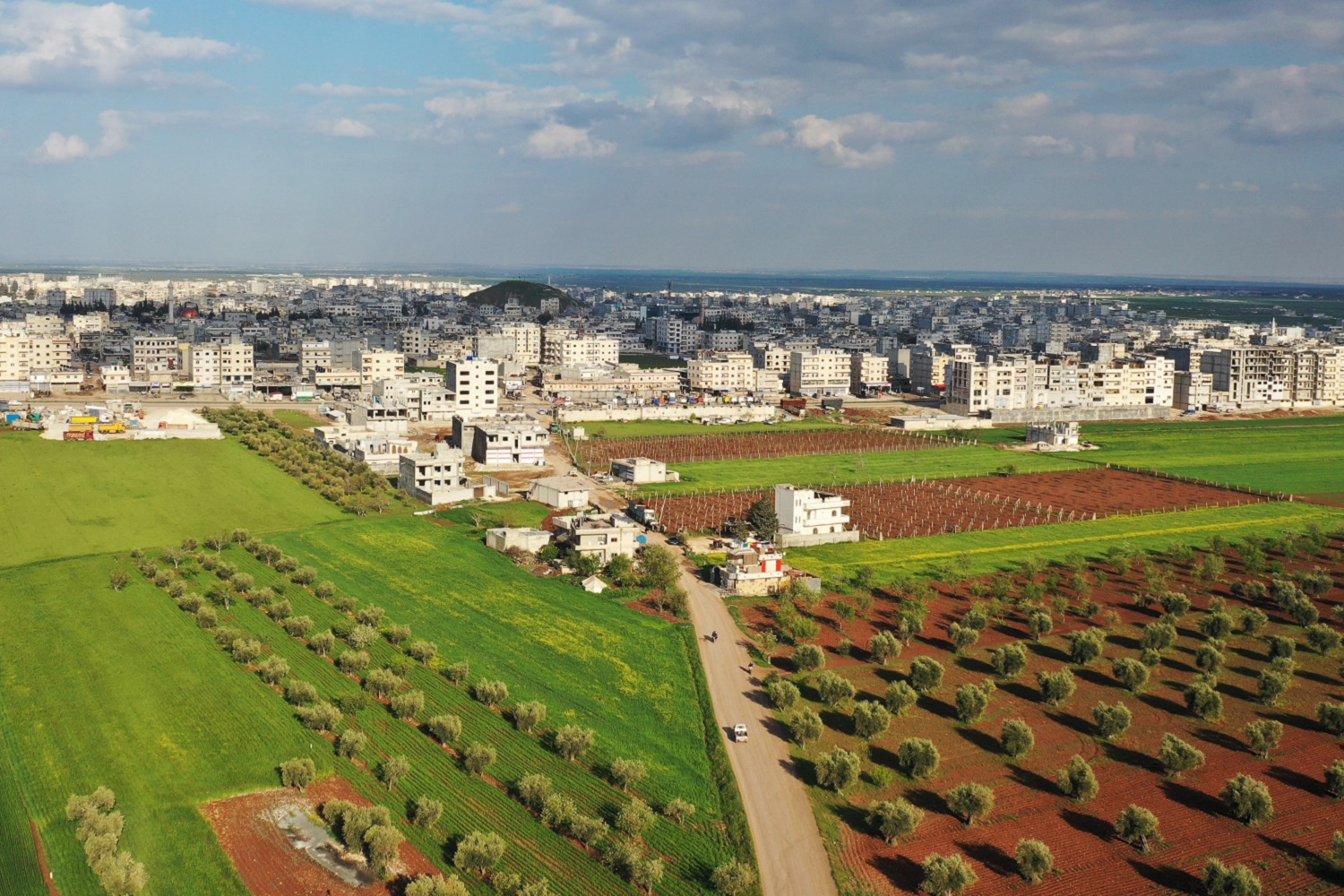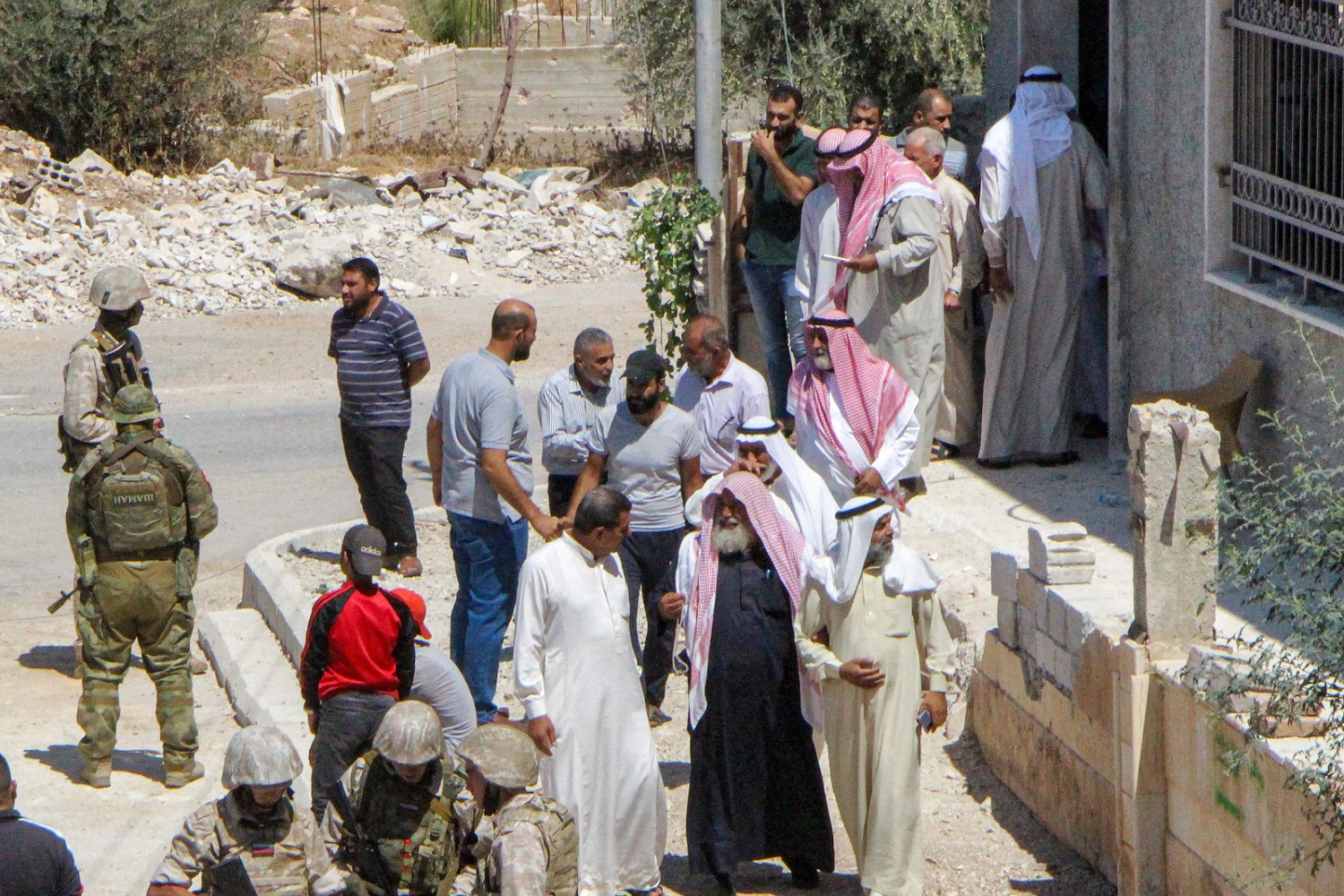In 2006, the United Nations (UN) published a Manual on Humanitarian Negotiations with Armed Groups in response to the absence of a structured approach to these practices. The message conveyed in the first lines of the manual is clear: ‘Humanitarian negotiations with armed groups can often be a humanitarian necessity’. However, thirteen years later, practices of humanitarian negotiations are still inadequate.
This blog by Juline Beaujouan discusses these practices, drawing lessons from the Syrian conflict that has raged since 2012.
Local tractability
The Syrian conflict has birthed hundreds of armed groups fighting for pockets of territory, often at a highly localised level. For daily humanitarian practices, this fragmentation and localisation has meant that aid must transit across multiple conflict lines and must be guaranteed through countless negotiations to reach people in need. In other words, a number of armed groups must be relied on at some point in the transit process. However, acknowledging links with warlords and gunmen is not easily admissible for many international nongovernmental organizations (INGOs) that have tried to balance the humanitarian principle of neutrality with the practicalities of war-torn Syria. This is reflected in the words of a senior INGO staff member working in the southern governorate of Daraa for several years:
It is against our policy to engage with armed groups, but we do coordinate with them because our access has to be authorised by the security. However, we always refuse armed escorts for our convoys. Effectively, military groups are the first providers of access in Syria; they are also valuable sources of information and keep us – through our local partners – updated about potential risks for aid delivery, activities, or visits. For instance, they will tell us if there are clashes. Effectively, all our projects need to pass by security before we can implement them.
Indeed, the mission to connect and interact with armed groups, with all the hazards involved, falls on Syrian humanitarian staff that are implementing the activities of INGOs. At times, the task requires expert mediation and negotiation skills.
A worker with a Syrian nongovernmental organization (NGO) – whom we will call Mohammad to protect his identity – reflected on negotiation practices for humanitarian aid during the last period of the siege of East Ghouta, which lasted between April 2013 and April 2018 and left some 400,000 people trapped in the eastern countryside of the Syrian capital, Damascus. According to Mohammad, in addition to the military offensive launched by the Syrian regime forces against anti-government forces, two main rebel factions were fighting over the control of the areas:
Clashes between these two groups impacted aid transit. We first had to cross a checkpoint controlled by Assad’s army, then several checkpoints controlled by Faylaq al-Rahman or Jaysh al-Islam. As a result, we had to replicate our activities on each side. If we wanted to, let us imagine, transit food baskets to reach areas controlled by Faylaq al-Rahman through a checkpoint controlled by Jaysh al-Islam, the armed men of Jaysh al-Islam would require us to leave 100 food baskets for people living in their areas.
Mohammed also recorded how armed groups monetised[i] the movement of humanitarian aid in eastern Ghouta:
Jaysh al-Islam made our work more challenging because they created taxes at two checkpoints; it originally amounted to 1% of the goods’ value. In 2017, when the conflict escalated in East Ghouta, the fee for aid transit increased from 200 to 2,300 Syrian liras per kilogramme of goods… It was essential for us to pay taxes at checkpoints because it guaranteed the safety of our convoy. At least, this was the rationale of Jaysh al-Islam because, in fact, it was impossible to ensure our safety in the middle of the conflict as bombs were constantly falling from the sky. Effectively, they never really tried to protect us and the aid, but they would ensure that the convoy would not be attacked by their armed men or by smugglers.
In Syria, opposition armed groups do not have monopoly over the monetisation of humanitarian aid. The Syrian regime forces, until today, use similar practices even in areas where peace has officially returned, like in the south of the country[ii]. As described by a humanitarian worker who used to implement relief projects in Syria from across the Lebanese border:
When we were implementing projects in Zabadani [in the northeast of Damascus], which is very close to the Lebanese border, we had to pay 500 Syrian liras to armed men of the Hezbollah to cross the border. The Lebanese army does not have any control there.
The success of negotiations for the transit of humanitarian aid across Syria is circumstantial and heavily relies on the presence of local guarantors who have strong links with armed factions. For instance, Mohammad himself was not involved in negotiations:
Negotiations with armed groups were made by our logistic and project officers based in the areas we wanted to reach in Syria. Both had strong social networks and relations with local committees that supported local NGOs like ours to negotiating the transfer of aid. For instance, in 2017, a local committee helped us secure an agreement with several armed factions according to which we did not have to pay any money, including taxes, to pass through their checkpoints and areas of control. However, these local committees do not have such power in all areas.
International rigidity
In Syria, INGOs and NGOs are funded by international donors whose views on humanitarian negotiations with armed groups are rooted in a polarised and alienated perception of the Syrian environment. It raises the question: Are practices of humanitarian negotiation and transit in line with donors’ policies? The simple answer is no. A striking example is the refusal of INGOs to allocate part of their budget to facilitate aid transit through checkpoints for any armed groups other than the Syrian army, leading to Syrian humanitarian workers paying taxes at checkpoints from their salaries: “We do not have the option not to pay taxes at checkpoints if we want the aid to reach populations.”
The author met several representatives of non-Syrian (I)NGOs to discuss their views and at-a-distance practices for bringing humanitarian aid into Syria; only a handful of representatives agreed to discuss the issue. One representative used to work for a faith-based British NGO funded by the Department for International Development (DFID)[iii] which implemented projects in Syria. She acknowledged the gap between strict funders’ policy and the complex reality of the Syrian context which required flexibility to secure aid delivery:
Our funders did not allow for certain practices such as paying taxes at military checkpoints, which they consider bribery. At some point, one roundtable was held between DFID and a number of INGOs and Syrian NGOs based in the United Kingdom (UK). We tried to make the case that DFID had very strict policies in place and that these policies did not take into consideration the reality on the ground for Syrian partners – especially in terms of security. For instance, we told them that bribes just have to be paid, otherwise, we are very limited in what we can do. However, DFID refused to follow up on the roundtable. They used the excuse that the meeting was held under Chatham House rules and that, as a consequence, they could not discuss it further.
Another meeting happened with DFID in early 2014. They presented the budget for Syria, and already back then, they insisted that nobody should use illegal money transfers. We, humanitarian workers, understand the security issues for DFID, especially when it comes to getting aid into areas like Idlib that are controlled by armed groups listed as terrorist organisations. But we also feel that they emphasise too much on their own protection and that of expatriate staff rather than Syrian partners and people in need.
The truth is that when humanitarian aid goes somewhere in Syria, for instance Idlib, it does not benefit armed groups directly. Instead, it ensures these armed groups do not fill a vacuum.
This account highlights two sets of challenges: The first involves transferring money in a country divided into four spheres of governance with their own regulations and infrastructures. For instance, transferring money to northwest Syria is simply impossible through usual channels due to the absence of a banking system. Money for humanitarian projects must transit through informal channels hindering traceability and transparency. Secondly, while the primary goals of humanitarian action are to save lives and alleviate suffering, it can also reinforce the political and social legitimacy of actors that directly contribute to the conflict.
Whose legitimacy?
The governorate of Idlib, located in the northeast of Syria and mostly controlled by the Salafi armed group Hayat Tahrir al-Sham (HTS)[iv], illustrates the dilemma faced by the humanitarian community in the country. The group controls the last UN border crossing between Syria and Turkey, Bab al-Salam. Despite its attempts to seemingly soften its stance by showing pragmatism over the governance of Idlib governorate – theoretically in the hands of the de-facto Salvation Government – the group is still listed a terrorist organisation by a number of Western states. The head of the Local Administration Councils Unit (LACU), a Syrian civil society organisation that promotes good governance and local administration, denounced the double standards of UN policies relating to the delivery of humanitarian aid in the northwest: “The UN has more coordination with HTS than the Interim Government[v] and local councils.”
The relationship between the UN and HTS puts local humanitarian actors in northwest Syria at a disadvantage. The founder of Violet Organization, a Syrian charity and large aid provider in opposition-held areas, shared a story that illustrates how HTS became a crucial asset for an international presence on the ground:
Once, a dispute arose, and HTS threatened Violet to take all our assets. We went to the [UN Office for the Coordination of Humanitarian Affairs] OCHA for support but they said they could only negotiate with HTS to some extent because they needed them to approve the border resolution [to facilitate the entry of UN aid from Turkey].
This story highlights the lack of accountability of the UN towards Syrian humanitarian partners, as well as the impossibility of the UN remaining politically neutral when securing aid delivery.
Paradoxically, or so it seems, the importance and legitimacy of HTS as a privileged partner for the delivery of humanitarian aid in northwest Syria is reinforced by the armed group’s primary enemy: the Syrian regime, headed by President Bashar al-Assad, and the regime’s use of humanitarian aid as a negotiation chip to secure political gains.[vi] Until July 2023, only one out of four UN border crossings between Syria and neighbouring countries was operating. Bab al-Salam, managed by HTS on the Syrian side, was thus the last ‘lifeline’ for four million Syrians stranded in the northwest of the country.[vii] According to the head of LACU, this situation has arisen from the fragmentation of legitimacy in northwest Syria:
Armed groups have the legitimacy of force in the ground. Opposition governments and their local councils have the legitimacy of representativeness. Finally, local civil society has the legitimacy of credibility through its action.
Indeed, the distinction between the military power of armed groups and the political power of opposition governments in northwest Syria, especially in Idlib, is blurry and yet, each faction competes over opportunities to reinforce their legitimacy on the ground. In this race, monopoly over the delivery of humanitarian aid is a crucial asset.
Devolution of risk and responsibility
Beyond the many challenges on the ground – including the rigidity of donors’ policies and the lack of equal treatment of armed groups operating in Syria – practices of humanitarian negotiation illustrate how the humanitarian community is highly fragmented and hierarchical.
A project manager working for a European INGO regretted the pervasiveness of negative perceptions about the work of INGOs working in Syria:
We are prejudiced against because we work inside Syria. Donors have the perception that our projects are not based on need assessment or that we are less accountable because the situation on the ground is so complex. Effectively, reduced access to certain areas like Daraa means that it is harder for us to monitor needs and aid delivery, which means that we are less accountable when it comes to equity. But we do not do less than any other NGO around the world and we face similar limitations, standards, and accountability. Yet, it is becoming harder and harder to secure funding.
The issue of accountability, indeed, is crucial. Syrian partners are accountable to (I)NGOs which are in turn accountable to funders. But who is accountable to Syrian humanitarian partners, let alone to the beneficiaries of aid? Omar, who used to work with OCHA and witnessed the shortcomings of the humanitarian system in Syria, calls for a reform of the UN and establishing new accountability mechanisms in conflict-affected countries:
I look at OCHA as host for agency and accountability from donors to people. That is what I call the Syrianisation initiative, that is, how can we not only have a presence on the ground but also be accountable to our people.
Undeniably, Syrian partners on the ground take all risks to negotiate and implement the delivery of humanitarian aid. However, many (I)NGOs working in Syria still do not have any responsibility to protect as part of their policies and budget, even though local humanitarian workers have campaigned to establish protection measures. Here again, the siege of eastern Ghouta set a precedent, as a Syrian NGO worker explained:
Before 2018, there was no duty of care for Syrian humanitarian staff inside Syria. INGOs would give money for projects, and it was our job, Syrian NGOs and workers, to transfer it. What we also did is that, in 2018, we created a sort of duty of care for our colleagues on the ground. Each of the organisation’s members based outside Syria paid US$ 300 per month from our own salary to ensure the safety of our colleagues. […] At the end of 2018, when the [siege of Ghouta] ended, a group of INGOs met and created a duty of care for local staff. This duty of care aimed to cover urgent needs such as food or the lack of salary in-between jobs. It took this group of INGOs six months to create this duty of care policy. They now include it in their budgets, and it is now compulsory for Syrian NGOs funded by international funders to provide this duty of care to local staff inside Syria.
Despite improvements to the treatment of Syrian humanitarian staff, many more interventions are needed to enable Syrian partners to implement humanitarian action safely and effectively. On the one hand, the duty of care must become systematised across all organisations, including INGOs. Too often, the protection of Syrian partners during military escalation relies on armed groups’ individual inclinations rather than structured, organisational methods, as described by a former project manager for an INGO working in Aleppo before the offensive of the Syrian army:
When Aleppo was under attack [in December 2016], we had no procedure to evacuate our staff. I insisted we use the funding for the humanitarian project and reallocate it to the extraction of our Syrian colleagues from Aleppo to Turkey through the UN border crossing. We also used the funding to pay their rent in Turkey for a while.
On the other hand, there must be a better division of the security burden on humanitarian actors across the spectrum. In the words of the founder of Violet Organization working in the opposition-held areas in northwest Syria:
90% of the time, security concerns come from the Syrian army and Russia. Local armed infighting only causes concern in 10% of the time. Unfortunately, all these concerns are born by our local staff on the ground. For instance, some time ago, we lost two of our staff in the targeted bombing of an ambulance by a Russian plane. The third passenger lost his arm. We were intervening after a bombing in a civilian area to evacuate some civilians. The plane chased our ambulance and bombed it. There is a risk transfer from INGOs to local NGOs. […] Despite all our efforts, several international donors paused their collaboration with several Syrian NGOs in Idlib without giving any reason; this lasted for years. We are pushed to fail.
In Syria, like in many war-torn countries, humanitarian negotiations with armed groups are a humanitarian necessity. It is essential that the practices of humanitarian negotiations reflect the changing nature of conflicts which are becoming increasingly fragmented and complex. Moreover, the lived experiences of the actors negotiating for the transfer of humanitarian aid across conflict lines need to be accounted for in international guidance and procedures. These changes are essential for providing better protection to the victims of conflicts and to those who risk their lives to alleviate their suffering.
References
[i] The monetisation of humanitarian aid remains a challenge in areas controlled by the regime. For more information, see Beaujouan, J. et al. (2023). Navigating Fragmentation: Improving Free Movement in Daraa, South Syria (Policy Brief).
[ii] Ibid.
[iii] In 2020, DFID merged with the Foreign Commonwealth Office (FCO) and replaced by the Foreign, Commonwealth & Development Office (FCDO).
[iv] Hayat Tahrir al-Sham is a coalition of Salafi-jihadi groups that includes former al-Qaeda branch in Syria Jabhat al-Nusra.
[v] The Interim Government is a civil opposition government affiliated with Turkey that administers three areas that slipped away from the control of the Syrian regime. These areas include Euphrates Shield region (between Jarablus in the east, Azaz in the west and Marea in the South), Olive Branch region (including Afrin and its administratively affiliated cities), and Peace Spring region (between Ras al-Ain in the east and Tal Abyad in the west in the north of Raqqa city).
[vi] For more information on the instrumentalisation of humanitarian aid by Syrian conflict actors, see Beaujouan, J. (2021). Covid-19: Tool of Conflict or Opportunity for Local Peace in Syria? (Research Report).
[vii] On 11 July 2023, the UN Security Council failed to renew the last remaining UN border crossing between Turkey and northwest Syria. The Syrian regime accepted to reopen the crossing on the condition of full cooperation and coordination with the [Syrian] government, and of the UN not communicating with what it called ‘terrorist organisations’. Negotiations were still in a stalemate at the time of writing.



